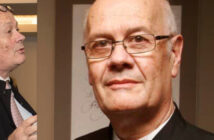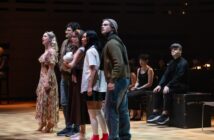2017-18 Marks Innovative Season of Firsts for Opera Philadelphia, from Fall’s Inaugural O17 Festival – Highlighted by Global Partnerships and Three World Premieres – to Spring’s Back-to-Back New Productions
2017-18 marks a landmark season for Opera Philadelphia, highlighted by the launch of its new, game-changing, annual season-opening festival. A twelve-day immersion featuring seven operatic happenings, three world premieres, and one superstar Festival Artist, at six venues across the city, the festival’s inaugural edition – O17 (Sep 14–25) – represents a radical new way to experience opera. Already welcomed as “a bold move aimed at making Philadelphia a compelling stop on the opera-lover circuit” (Philadelphia Inquirer) that promises to “blanket the city with opera” (Washington Post), this makes for “a significant expansion of Opera Philadelphia’s seasonal offerings” (Opera News). Furthermore, boasting partnerships with such leading international presenters as Harlem’s Apollo Theater and London’s Hackney Empire, as well as with such key local cultural institutions as the Barnes Foundation and Philadelphia Museum of Art, the festival makes a fittingly forward-thinking start to a season in which Opera Philadelphia continues to prove itself “the very model of a modern opera company” (Washington Post).
General Director & President David B. Devan explains:
“The 2017-18 season truly pushes the limits of how and where and why we experience this wonderful art form. Our city is our stage, and our stage is our city, as we present three magnificent productions in the historic Academy of Music and engage our community in a festival that will bring new audiences to opera and to Philadelphia. We are delighted to collaborate with so many of our city’s treasured institutions like the Philadelphia Museum of Art and the Barnes Foundation, as well as internationally significant co-producers like The Apollo Theater and Hackney Empire in London. Together, we are creating a breadth of new operatic repertoire which is gloriously interdisciplinary and tremendously inspired in its use of sound, space, and storytelling.”
Jack Mulroney Music Director Corrado Rovaris adds:
“Opera Philadelphia has been working tirelessly to revitalize opera for the 21st century, commissioning world premieres and energizing the classical canon by providing established and emerging artists with opportunities to create their most imaginative work. This season, first with O17 and continuing through the spring, our mission has truly reached a new level. I invite opera lovers, and those who perhaps find opera a bit intimidating, to join us.”
Opera Philadelphia is justly recognized for commissioning new works that are “ambitious, accomplished and dramatically direct” (New York Times), and O17 is highlighted by three world premieres: Elizabeth Cree, a chamber opera by Pulitzer Prize-winning composer Kevin Puts and librettist Mark Campbell, in collaboration with London’s Hackney Empire; We Shall Not Be Moved, an interdisciplinary co-commission and co-production with The Apollo Theater and Hackney Empire, from the creative team of Haitian-American composer Daniel Bernard Roumain, librettist and spoken word artist Marc Bamuthi Joseph, and peerless director-choreographer-dramaturge Bill T. Jones; and The Wake World, a musical journey through the art collections of Philadelphia’s Barnes Foundation from composer-in-residence David Hertzberg. Complementing these new works are the exclusive East Coast presentation of Barrie Kosky’s renowned take on Mozart’s The Magic Flute; and the Philadelphia premiere of War Stories, a site-specific and all-too-topical pairing at the Philadelphia Museum of Art of Il combattimento di Tancredi e Clorinda, Monteverdi’s prescient tale of Christian and Muslim warriors, with I Have No Stories To Tell You, a modern response to it by composer-in-residence program alumnus Lembit Beecher and librettist Hannah Moscovitch. To complete the compelling O17 lineup, inaugural Festival Artist, superstar soprano Sondra Radvanovsky, offers a solo recital and a masterclass for emerging artists, and there will be a free HD video broadcast in Opera Philadelphia’s celebrated Opera on the Mall series.
Next spring, Opera Philadelphia rounds out this season of firsts with back-to-back new productions by a pair of award-winning directors. Scotland’s Paul Curran offers an original treatment of Bizet’s beloved Carmen (April 27–May 6), and Will Kerley helms the Philadelphia premiere of George Benjamin’s phenomenal critical sensation Written on Skin (Feb 9–18).
About the 2017-18 productions:
• O17 (Sep 14-25)
Elizabeth Cree (world premiere)
Music by Kevin Puts; libretto by Mark Campbell
Based on the novel The Trial of Elizabeth Cree by Peter Ackroyd
Co-commissioned and co-produced with London’s Hackney Empire
Sep 14, 16m, 19, 21, 23m, 2017
Perelman Theater
Composer Kevin Puts and librettist Mark Campbell, the creative team behind 2012’s Pulitzer Prize-winning Silent Night, return to Opera Philadelphia for the world premiere of a chamber opera based on Peter Ackroyd’s The Trial of Elizabeth Cree, a novel the Los Angeles Times calls “downright exhilarating.” Set in London in the 1880s, this highly suspenseful and theatrical opera interweaves several narratives: the trial of the titular heroine for the poisoning of her husband; a series of brutal murders committed by a Jack the Ripper-style killer; the spirited world of an English music hall; and, finally, some “guest appearances” by luminaries from the Victorian Age. Shocking and entertaining, Elizabeth Cree is a work that combines factual history with imaginative fiction.
Mark Campbell, “a major force in opera” (Opera News) and one of the most in-demand librettists working in the genre today, instantly saw operatic possibilities in Ackroyd’s novel. He recalls:
“I read The Trial of Elizabeth Cree when it first came out in 1995 and my desire to adapt it into a musical form never waned. It has been both a thrill and a challenge writing this libretto and trying to capture the many levels in Peter Ackroyd’s brilliant novel – murder mystery, historical fiction, English music hall, Gothic horror – while keeping the audience on the edge of their seats for 90 minutes.”
Kevin Puts – “a brilliant composer with a strong musical voice” (New York Times) – explains:
“Elizabeth Cree is fast and furious, moving from scene to scene with the pace of a thriller, and I have delighted in working toward a seamless and organic flow to it all.”
Fresh from debuts at the Metropolitan Opera and the Royal Opera House, Covent Garden, mezzo-soprano Daniela Mack – a finalist for the 2013 BBC Cardiff Singer of the World Competition, with “a voice like polished onyx: strong, dark, deep and gleaming” (Opera News) – makes her Opera Philadelphia debut in the title role of Elizabeth Cree. As she points out:
“The role of Elizabeth is complex! In a very short time, we see her grow from an abused and penniless orphan, to a wildly successful music hall performer, to a dignified Victorian lady on trial for the murder of her husband. The chance to embody so many different aspects of a single character will be a fascinating challenge for me as a performer.”
Opposite her, Troy Cook lends his “beautiful, robust baritone” (New Criterion) to Elizabeth’s husband, John. Composing this role posed especial challenges, as Puts describes:
“John Cree is writing in his diary about these gruesome murders, and for him it’s a turn-on. So do I set it from his point of view or do I make reference to its macabre nature in the music? I think in the end it has to do both: go between romance and horror.”
Charismatic tenor Joseph Gaines returns to Opera Philadelphia to round out the cast as charming Music Hall star Dan Leno. Obie and Drama Desk Award-winner David Schweizer directs the production, with Jack Mulroney Music Director Corrado Rovaris conducting the Opera Philadelphia Orchestra in the Kimmel Center’s intimate Perelman Theater.
See Puts, Campbell and Mack discuss Elizabeth Cree over drinks.
We Shall Not Be Moved (world premiere)
Music by Daniel Bernard Roumain; libretto by Marc Bamuthi Joseph
Co-commissioned and co-produced with The Apollo Theater and Hackney Empire; developed in partnership with Art Sanctuary
Sep 16, 17, 18, 21, 23, 24, 2017
Wilma Theater
Underscoring the company’s commitment to programming works relevant to its multicultural community, Opera Philadelphia presents the world premiere of We Shall Not Be Moved, a co-commission and co-production with The Apollo Theater and Hackney Empire. The new chamber opera draws on the collective talents of Haitian-American composer Daniel Bernard Roumain, whose work blends classical music with funk, rock, and hip-hop; librettist, arts activist, and spoken word performer Marc Bamuthi Joseph; and Bill T. Jones, the celebrated choreographer, theater director, and dancer whose accolades include a MacArthur Fellowship, two Tony Awards, a Kennedy Center Honor, and a 2013 National Medal of Arts. Informed by a tragic moment from Philadelphia’s past while suggesting an alternate, more hopeful future, their new opera is the story of five North Philly teens on the run. They take refuge in an abandoned, condemned house at the exact West Philadelphia location that served as headquarters of the MOVE organization in 1985, when a standoff with police infamously ended with a neighborhood destroyed and eleven people dead, including five children. The teens feel comforted and even somewhat inspired by the ghosts that haunt their new home, and come to consider their squatting not merely as self-preservation, but as an act of resistance.
Combining R&B, jazz, and classical vocal styles with spoken word, contemporary movement, video projection, and a brooding, often joyful score, We Shall Not Be Moved is, Bill T. Jones confesses, “ambitiously interdisciplinary.” He adds:
“We are plotting the course through treacherous terrain where musical forms, literary forms, and movement styles collide and, hopefully, fly.”
Daniel Bernard Roumain shares this exhilaration about the project. He says:
“I’m excited and elated to be in collaboration with artists who share a long history of storytelling, deep inquiry, and innovation within the theater. When Opera Philadelphia approached me about creating a new work for them, I immediately wanted to develop a new chamber opera with Bill and Marc supporting an eclectic score within an immersive, theatrical experience. We have all been collaborating with one another for years, and this work, in some ways, is a culmination of dreams, desires and talents.”
Marc Bamuthi Joseph explains:
“My hope for the libretto is that it sensitively examines a historical moment, and legibly suggests an alternate future through the eyes of its young protagonists. Structurally, the piece embellishes the traditional staples of the opera form with post-hip hop flourishes. This elasticity, this future-classic take on history in the present tense, is demanding a lot from the creative team, but I think we’re uniquely prepared for the task.”
We Shall Not Be Moved premieres in the Wilma Theater, where spoken word artist Lauren Whitehead makes her company debut as Un/Sung, the teens’ self-appointed leader, and Kirstin Chávez brings her “glorious voice” (Opera News) to the role of Glenda, a Philadelphia police officer whose encounter with them leads to a standoff that threatens to repeat history. Marian Anderson Vocal Award-winner John Holiday, described as an “impressive young countertenor” with a “bright, virile voice” (New York Times), creates the role of John Blue, with bass-baritone Aubrey Allicock as John Henry and baritone Adam Richardson as John Mack. After the Philadelphia premiere, We Shall Not Be Moved will immediately travel to The Apollo Theater for its first New York performances, before making its European premiere at the Hackney Empire in October.
The Wake World (world premiere)
Music and libretto by David Hertzberg
Based on the story The Wake World by Aleister Crowley
Sep 18, 19, 23, 24, 25, 2017
The Barnes Foundation
Co-presented by Opera Philadelphia and the Barnes Foundation
Two of the early 20th century’s most prolific and polarizing artistic visionaries come together in The Wake World, which draws on the work of both physician, inventor, art collector, and writer Dr. Albert C. Barnes (1872-1951), a Philadelphia native, and British poet, magician, and occultist Aleister Crowley (1875-1947), who cultivated a reputation as the “wickedest man in the world.” In a hallucinatory one-act opera inspired by Crowley’s fairy tale of the same name, Opera Philadelphia Composer in Residence David Hertzberg and director R.B. Schlather take visitors on a fantastical journey through the Impressionist, Post-Impressionist, and early Modern masterpieces in Philadelphia’s Barnes Foundation. Visitors will experience Dr. Barnes’s renowned collection as never before, when artworks jump off the gallery walls and into the action in a fully immersive performance anchored by mezzo Rihab Chaieb and the Opera Philadelphia Chorus.
Composer David Hertzberg, whose “riveting work demonstrates that a gifted young composer can be inspired by masters and still speak with a vibrantly personal style” (New York Times), describes his inspiration:
“To me, the Barnes Foundation is less like a museum and more like a shrine: a strange and wondrous temple exhumed from outside of time, wrought with symbols and hieroglyphs whose sympathetic resonances carry some unspoken and inarticulable significance. I wanted to create something that would explode this glorious and singular quality of the collection, and transform the way people experience the space. When I first read Aleister Crowley’s The Wake World several years ago, I was both confounded and intoxicated by it, and it has lingered with me since. During a site visit to the Barnes, I was struck by an essential sameness in the creative visions of Crowley and Dr. Barnes – that they both sought to disclose the veiled unity behind seemingly disparate things, to contrive a whole of their ever-expanding worlds – and felt that the premise of Crowley’s ecstatic tale of self-discovery would be the seed from which my work would grow.”
R.B. Schlather, the young director who impressed the New York Times with his “intriguing, inventive directorial vision” and Opera News with his “ability to demolish the barriers of propriety and politeness that seem to plague much of traditional operatic experience,” explains why the project appealed to him:
“My own first visit to the Barnes collection left me marveling at the quality and variety of the paintings and objects, and also the unique way they are arranged. This is the highest compliment I can give: I love encountering art that is personal, mysterious, and puzzling. We want to create a disorienting experience of the Barnes for those who have been before as well as those patrons coming for the first time, creating their own personal experience of both the fantastic collection and the transformative operatic happening.”
Thom Collins, executive director and president of the Barnes Foundation, comments:
“At the Barnes, we seek to create new points of entry into the collection, and to highlight it as the limitless fount of inspiration that it is. We look forward to welcoming our members, visitors and new audiences to experience the ground-breaking world premiere of The Wake World, and to engage with the collection in a whole new way. 017 is an incredibly innovative, creative operatic program that will engage and celebrate Philadelphia’s many diverse communities and beyond. We are thrilled to participate in the inaugural festival.”
The Magic Flute
Music by Wolfgang Amadeus Mozart; libretto by Emanuel Schikaneder
Exclusive East Coast appearance of Komische Oper Berlin production
Co-produced by Los Angeles Opera and Minnesota Opera
Sep 15, 17m, 20, 22, 24m, 2017
Academy of Music
“Barrie Kosky has transformed The Magic Flute into a stunning live-action cartoon. It is fun for the whole family.” So marveled the Los Angeles Times at the North American premiere of the Australian director’s playfully subversive new production of Mozart’s comedy, in which 1920s silent movies meet David Lynch, with the singers performing amidst fanciful animated projections. The result is “a deliciously absurd blend of silent film and animation” (Berliner Morgenpost). “It is a tour de force. The audience oohed and aahed, clapped, gasped and guffawed” (Guardian). Indeed, created by the British theater group 1927, this Magic Flute “points the way toward a freer, more experimental style of producing opera” (New York Times).
In Opera Philadelphia’s exclusive East Coast presentation of the Komische Oper Berlin production, tenor Ben Bliss, a 2016 recipient of Lincoln Center’s Martin E. Segal Award, reprises his star turn as Tamino opposite Rachel Sterrenberg, who lends her “rich, iridescent soprano” (Financial Times) to Pamina. Olga Pudova revisits her “immaculate and airy” (Guardian) portrayal of the Queen of the Night, and baritone Jarrett Ott, who proved himself “a star” (Parterre Box) in Opera Philadelphia’s East Coast premiere of Cold Mountain, returns to make his role debut as Papageno. David Charles Abell, an “inspiring conductor” (Financial Times), leads the Opera Philadelphia Orchestra and Chorus in five performances at the Academy of Music.
War Stories
Il combattimento di Tancredi e Clorinda
Music by Claudio Monteverdi
I Have No Stories to Tell You (Philadelphia premiere)
Music by Lembit Beecher; libretto by Hannah Moscovitch
Sep 16, 17, 19, 21, 23, 2017
Philadelphia Museum of Art
Co-presented with Philadelphia Museum of Art
Against the dramatic backdrop of the Philadelphia Museum of Art, Opera Philadelphia presents the Philadelphia premiere of War Stories: a site-specific double-bill that finds common ground between 17th-century Italy and contemporary America. Both Lembit Beecher’s I Have No Stories to Tell You (2014) and Monteverdi’s Il combattimento di Tancredi e Clorinda (1638), the work that inspired it, explore gender and identity through the prism of war. Monteverdi’s opera tells the story of Tancredi, a Christian soldier, who battles a Muslim opponent, little knowing it is really his lover, Clorinda, in disguise. Only when he has mortally wounded her does Tancredi discover his adversary’s true identity. Opera Philadelphia brings their tragedy to life among the carved limestone cornices and twelfth-century fountain of the museum’s medieval stone cloister.
A graduate of Opera Philadelphia’s Composer in Residence program, composer Lembit Beecher collaborated with librettist Hannah Moscovitch to create a companion piece to Monteverdi’s work, addressing the aftereffects of war. Drawing on interviews with soldiers and army psychologists, their story depicts Sorrel, a soldier struggling to readjust to life at home after extended deployment in the Middle East. She is traumatized by her experiences, and reluctant to discuss them with a husband who no longer seems to understand her. Scored for a period instrument ensemble, and set in the museum’s soaring Great Stair Hall – one of the city’s most iconic civic spaces – I Have No Stories to Tell You explores the effects of war on one’s identity and sense of home. When it premiered at New York’s Metropolitan Museum of Art, the New York Times found the new opera “alluring,” and the Wall Street Journal declared it “ingenious,” admiring the way it “turned the home front into a place where nightmares hide in corners and war is never in the past.”
Lembit Beecher explains:
“The opera asks how war changes us, and in particular, how it affects our relationships with those closest to us. In many ways, the end of the Monteverdi is the beginning of I Have No Stories to Tell You. While Il combattimento is about the act of war, my piece is about the after-effects of war, the difficulty of coming home. Dramatically, both pieces center around a similar moment, a soldier holding a companion while s/he dies, though in the Monteverdi this moment is the culmination, and in my piece, it is a launching point, a memory that keeps haunting the soldier, Sorrel, throughout the work. Both pieces unfold as an intense series of confrontations between a man and a woman, and both pieces share many of the same themes: identity, gender, secrets, and sense of belonging. And ultimately, in each piece war acts as a catalyst for a changed sense of identity.”
In Philadelphia, as in New York, Craig Verm sings the dual roles of Tancredi and of Sorrel’s husband, in which he “let his robust, cutting baritone imbue his lines with the impassioned frustration of not being able to connect with his wife” (Opera News). He will be joined by mezzo-soprano Cecelia Hall, who brings “easy flexibility, arresting poise and enveloping warmth” (Financial Times) to her role debuts as Clorinda and Sorrel, with award-winning conductor Gary Thor Wedow on the podium. As at the Metropolitan Museum, the site-specific production is by Robin Guarino, whose “direction brilliantly developed the unstable heroine’s sense of anxiety” (Opera News).
Timothy Rub, the George D. Widener Director and Chief Executive Officer at the Philadelphia Museum of Art, says:
“The Philadelphia Museum of Art offers a rich and evocative setting for the performance of several works in Opera Philadelphia’s 2017-18 season. We are committed to civic engagement and to the role we can play in fostering creative spirit in our community. A collaboration like this is ideal for us, and a great opportunity for Opera Philadelphia to engage new audiences. The Museum is a place that, uniquely, brings the art of the past into conversation with the art of the present. Therefore, it is especially fitting that we host this exciting double bill – the pairing of a classic work by Monteverdi with a contemporary work that responds to it.”
Sondra Radvanovsky
Festival Artist
In recital: Sep 17m
Masterclass: Sep 18m
Perelman Theater
Sondra Radvanovsky is “a star soprano at the pinnacle of her talent” (Globe and Mail, Canada), known for the “distinctive timbre, expressive vibrato and gleaming top notes” of her “alluringly dark-hued voice” (New York Times). Its depth and color are matched by her artistry and versatility across a remarkable range that includes the title characters of Rusalka, Lucrezia Borgia, and the formidably challenging Norma. Widely recognized as one of today’s foremost Verdi sopranos, her signature role is Leonora in Il trovatore. No less distinguished in Donizetti, her recent headlining appearances in his “Tudor Queens” trilogy, when she starred in Anna Bolena, Maria Stuarda, and Roberto Devereux, were the centerpiece of the Metropolitan Opera’s 2015-16 season.
Opera Philadelphia is thrilled to welcome Sondra Radvanovsky to O17 as the inaugural Festival Artist. The superstar soprano will give a recital at the intimate Perelman Theater and conduct a masterclass with Opera Philadelphia Emerging Artists.
• SPRING 2018
Written on Skin (Philadelphia premiere)
Music by George Benjamin; libretto by Martin Crimp
New Production
Feb 9, 11m, 16, 18m, 2018
Academy of Music
A compelling story of lust and murder in medieval France, Written on Skin (2012) – the first full-length opera by Britain’s George Benjamin – has been variously described as “one of the first masterpieces of the 21st century” (New York Times), “the work of a genius unleashed” (New Yorker), and the “century’s most successful new opera” (Financial Times). As Rupert Christiansen of the UK’s Telegraph declared, “If Written on Skin doesn’t end up a modern classic, I’ll eat my hat.”
With a haunting libretto by British playwright Martin Crimp, Written on Skin depicts a powerful landowner (the Protector), who commissions a young artist (the Boy) to create an illuminated manuscript celebrating his life and family. When a relationship develops between the Boy and the Protector’s wife, Agnès, she compels him to reveal their love in its illustrations. Passion and violence erupt in the household, all while a mysterious cluster of angels watches the story unfold. Drawn from a 12th-century legend but imbued with a contemporary twist, “an achievement like Written on Skin is awesome by any measure” (New Yorker).
This major new addition to the canon makes its Philadelphia premiere in a new production from Will Kerley, whose past company successes include the acclaimed Philadelphia premiere of Thomas Adès’s Powder Her Face. Countertenor Anthony Roth Costanzo – “a bona-fide star” (New Yorker) – makes his first appearances in the dual roles of Boy and First Angel, and Lauren Snouffer lends her “rich-toned soprano” (Boston Globe) to that of Agnès, alongside the “matinee-idol good looks, vocal warmth and personal charm” (Opera News) of baritone Mark Stone in his role debut as the Protector. Jack Mulroney Music Director Corrado Rovaris leads the Opera Philadelphia Orchestra.
Carmen
Music by Georges Bizet; libretto by Ludovic Halévy and Henri Meilhac
April 27, 29m, May 2, 4, 6m, 2018
Academy of Music
Opera Philadelphia draws the season to a climactic close with a bold new production of Bizet’s intoxicating masterpiece, Carmen, from the team behind 2015’s “visually, vocally, viscerally satisfying” (Huffington Post) La traviata. Heading a stellar cast, Elizabeth Cree’s Daniela Mack returns to take on the title role, in which she has been credited with “match[ing]a bounty of rounded curves with her sultry mezzo voice” (Albuquerque Journal). Evan LeRoy Johnson demonstrates his “fervent tenor” (Philadelphia Magazine) as Don José, with soprano Kirsten MacKinnon, who impressed Opera UK with her “poise, expressive singing and excellent vocalism,” as Micaëla. Singing Escamillo is Zachary Nelson, of whom the Huffington Post confides: “It is no surprise that this young baritone is racking up competition prizes.” Yves Abel, former Principal Guest Conductor of the Deutsche Oper Berlin, leads the Opera Philadelphia Orchestra in a production directed by La traviata’s Paul Curran, who “surpasses all expectations” (Express, UK).
About the partners
For more information about Harlem’s Apollo Theater, visit apollotheater.org.
For more information about Philadelphia’s Art Sanctuary, visit artsanctuary.org.
For more information about Philadelphia’s Barnes Foundation, visit barnesfoundation.org.
For more information about London’s Hackney Empire, visit hackneyempire.co.uk
For more information about the Philadelphia Museum of Art, visit philamuseum.org, or contact the Communications Department by phone at 215-684-7860, by fax at 215-235-0050, or by e-mail at [email protected].
About Opera Philadelphia
Opera Philadelphia is committed to embracing innovation and developing opera for the 21st century. Described as “the very model of a modern opera company” by the Washington Post, Opera Philadelphia was the only American finalist for the 2016 International Opera Award for Best Opera Company. The company is charting a bold new path to September 2017, when Opera Philadelphia will open its 2017-18 season with an immersive, 12-day festival featuring seven operatic happenings in six venues throughout the city. The first festival, “O17,” will feature three world premieres and a Philadelphia premiere, plus the exclusive East Coast appearance of Barrie Kosky’s groundbreaking production of Mozart’s The Magic Flute, and a recital by superstar soprano Sondra Radvanovsky. Opera Philadelphia will continue to present a spring season each year, including two additional productions in February and April, making it the only U.S. opera company producing an annual opera season that begins with a dynamic festival. For more information, visit operaphila.org.












